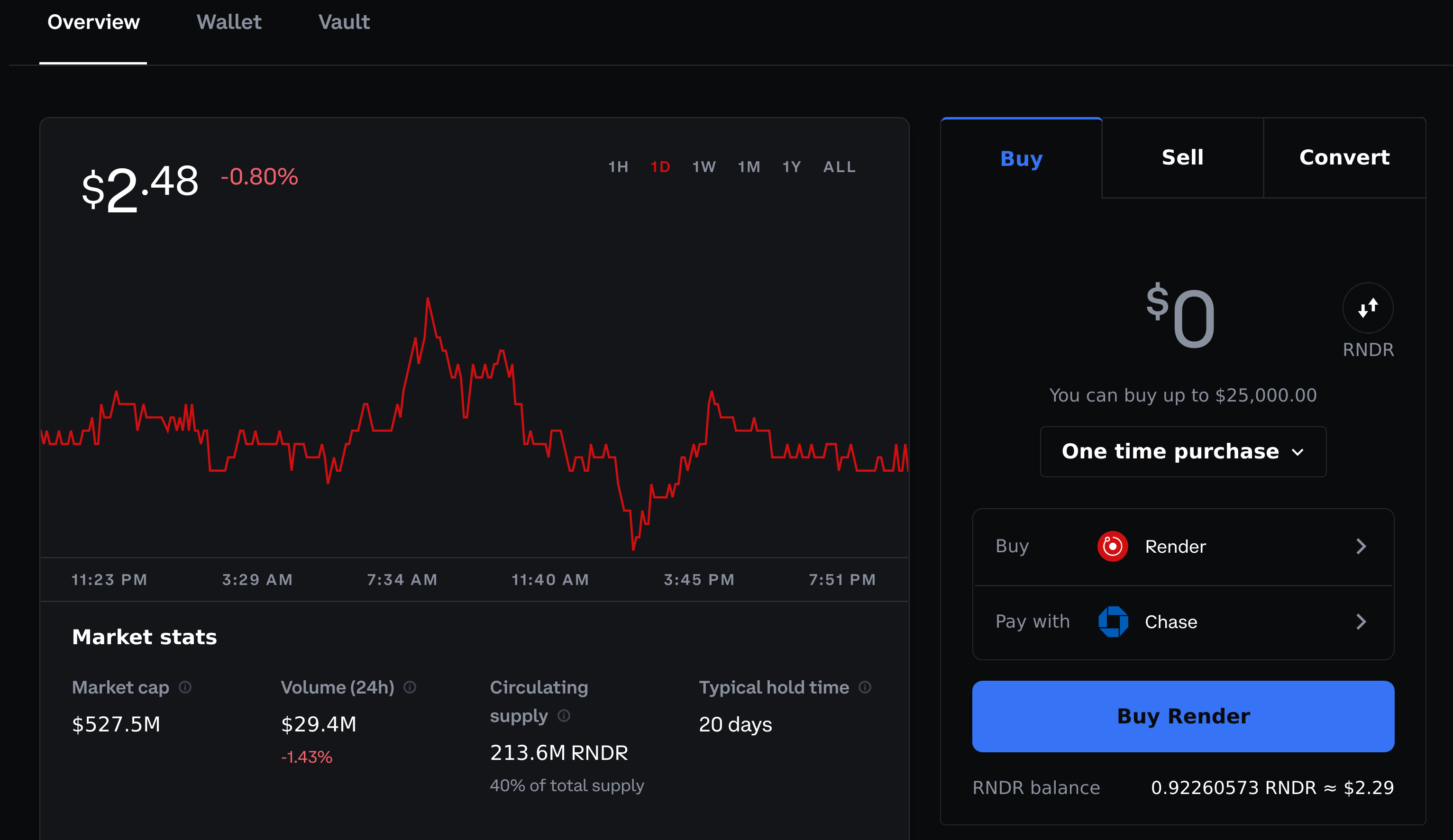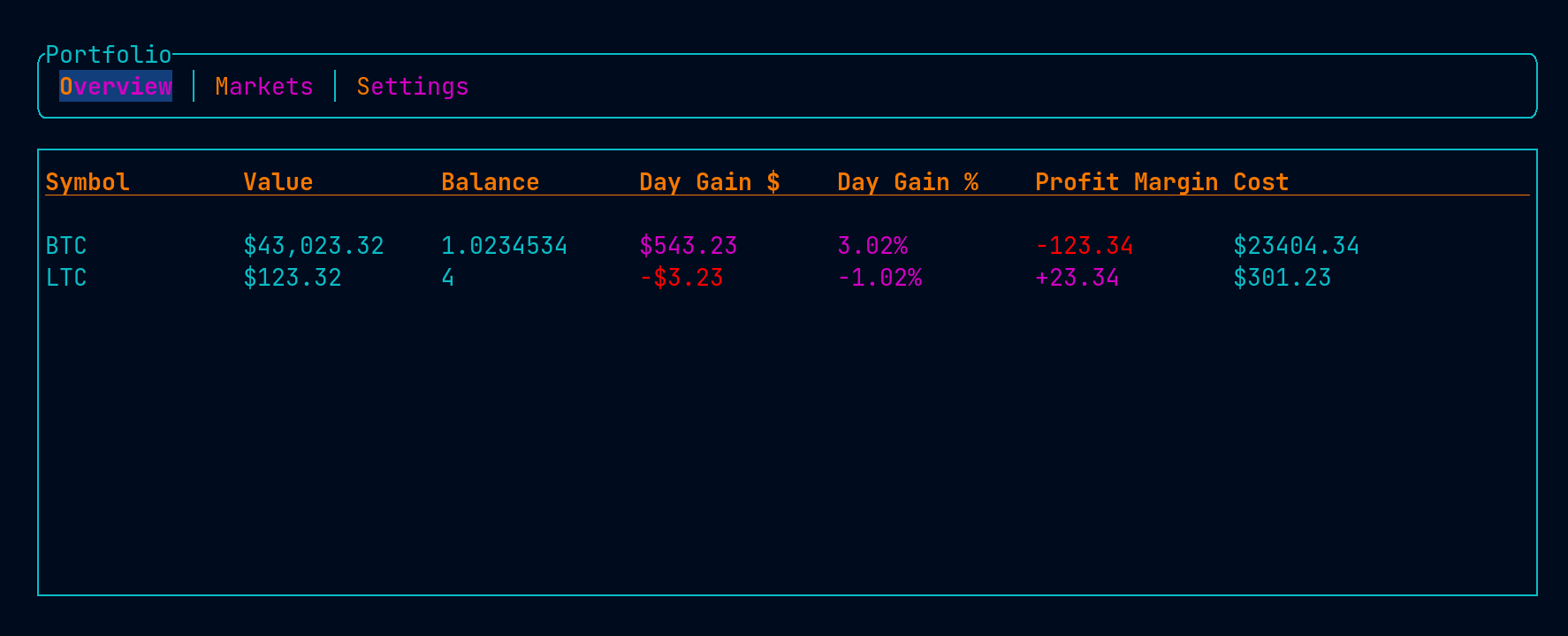07 Mar 2022 | Cryptocurrency-Portfolio-Performance-Tracking
Cryptocurrency is still young. It’s hard to think of it that way when you’ve been in the ecosystem for many years, but when you start to look at the capabilities of modern exchanges compared to modern trading platforms like TD Ameritrade, these differences become obvious.
I was originally tempted to start out with the usual, “this is not investment advice” spiel, but this actually is investment advice:
If you do not know whether you are making or losing money, there is a problem.
Although relatively sophisticated for its short lifespan, looking at a popular exchange like Coinbase reveals that you actually have very little useful information about your assets.

Most importantly, what’s my bottom line?
It’s great that PoopCoin is up 5% today, but if I’m $1,000 in the hole on my investment, that’s a relevant piece of information to have.
Aside
Your reply to this may be, “Well you shouldn’t be storing your assets on an exchange,” which is very true. You shouldn’t be. However, two things: a) if you think that the majority of people aren’t doing this anyway, you are disillusioned my friend, and b) even if you don’t do that, you still need a way to get this information as the wallet is not going to tell you either.
TD Ameritrade (not without its own issues, of course) shows a wealth of relevant information like net portfolio gain - both in percentage and in USD - as well as daily gain/loss information broken down per asset. This kind of information is invaluable for making informed decisions. What you choose to actually do with that information is investment advice, but I’m just advocating for having it available.
Realizing how vitally important this information is, I threw together a prototype relatively quickly to calculate this for me in real time. It pains me to present a shell script (essentially a polished turd) but I had no intention of sharing this at the time and it was quick and easy for prototyping. If there was enough demand for such a utility (and there should be) I would consider rewriting it, but I am also very busy so no promises.
Feature Wish List
- Net portfolio gain/loss in USD
- Percentage portfolio gain/loss
- Net gain/loss in USD per asset
- Percentage of gain/loss per asset
- Daily net portfolio gain/loss in USD
- Daily percentage of portfolio gain/loss
- Daily Net gain/loss in USD per asset
- Daily Percentage of gain/loss per asset
- “Cost per share” (not sure how TD calculates this, really nice though)
Clearly this is not a comprehensive investment tool at this time, but it is a step in the right direction.
Source
Obviously, these numbers are all doctored and do not represent my actual portfolio. This is also not an endorsement for any cryptocurrency listed here - invest at your own risk.
#
#!/bin/bash
#
# bitbal - personal cryptocurrency portfolio tracker
#
# token used to get price data from CoinMarketCap
API_TOKEN=<redacted>
# commands used to sanity check the environment. query your wallets here,
# as if they are not running, this program is going to produce some terrible
# output
declare -A WALLET_CMDS=(
[BTC]='bitcoin-cli getbalance'
[DASH]='dash-cli getbalance'
[LTC]='litecoin-cli -rpcwallet=litecoin getbalance'
[SOL]='solana balance | cut -d ' ' -f1'
)
# fancy colors
RED="\e[91m"
GOLD="\e[93m"
GREEN="\e[94m"
WHITE="\e[0;97m"
RESET="\e[0m"
# sanity check - are wallets running?
for wallet in "${!WALLET_CMDS[@]}"; do
if ! eval "${WALLET_CMDS[$wallet]} &> /dev/null"; then
echo -e "${RED}Non-zero return code from $wallet wallet${RESET}"
echo -e "${RED}Ensure that the $wallet daemon is running and your wallet is loaded${RESET}"
exit 1
fi
done
# total cost of your assets. needed to calculate profit margin.
COST=2912.34
declare -A ASSETS=(
[AMP]=72.3938245
[ANKR]=25.02894528
[BAT]=30.30850969
[BCH]=1.99999582
[BTC]=$(${WALLET_CMDS[BTC]})
[DASH]=$(${WALLET_CMDS[DASH]})
[DOGE]=5.27693119
[ETH]=.2
[FET]=6.03318299
[FIDA]=22.839705
[GRT]=4.10445856
[LTC]=$(${WALLET_CMDS[LTC]})
[OMG]=0.0444308
[PRO]=3.5156038
[RNDR]=0.92260573
[SOL]=$(${WALLET_CMDS[SOL]})
[USDC]=100.001034
[XLM]=22.9555687
)
# create array of current coin prices
declare -A PRICES=()
for key in "${!ASSETS[@]}"; do
PRICES[$key]=$(curl -s -H \
"X-CMC_PRO_API_KEY: ${API_TOKEN}" \
-H "Accept: application/json" \
-G "https://pro-api.coinmarketcap.com/v1/cryptocurrency/quotes/latest?symbol=$key" \
| jq ".data.$key.quote.USD.price")
done
# create array of current coin values (and track the total value)
TOTAL_VALUE=0
declare -A VALUES=()
for price in "${!PRICES[@]}"; do
VALUE=$(echo "${ASSETS[$price]} * ${PRICES[$price]}" | bc)
VALUES[$price]=${VALUE}
TOTAL_VALUE=$(echo "${TOTAL_VALUE} + ${VALUE}" | bc)
done
# calculate and colorize profit
PROFIT=$(echo "${TOTAL_VALUE} - ${COST}" | bc)
if [[ $(echo "$PROFIT > 0" | bc) -eq 1 ]]; then
PROFIT="${GREEN}${PROFIT}${RESET}"
else
PROFIT="${RED}${PROFIT}${RESET}"
fi
if [[ $1 == "-v" ]]; then
for coin in "${!PRICES[@]}"; do
echo -e "\e[9$(echo "$(date +%s) % 8" |bc)m$coin${RESET}"
echo " price: ${PRICES[$coin]}"
echo " balance: ${ASSETS[$coin]}"
echo " market value: ${VALUES[$coin]}"
done
fi
echo -e "${WHITE}----------------------------------------${RESET}"
echo -e "${GOLD}total portfolio value: ${GREEN}${TOTAL_VALUE}${RESET}"
echo -e "${GOLD}profit margin: ${PROFIT}${RESET}"
echo -e "${WHITE}----------------------------------------${RESET}"For price data, we need to query a reliable source that has a lot of great data we can leverage. I chose CoinMarketCap, but unfortunately the API requires an account and limits you to some X amount of queries per day without a paid account. Fortunately for me, without spastically checking the market every 10 minutes it’s almost impossible to exceed the allotted 300 requests or whatever.
So you have to plop an API token in there from your CoinMarketCap account.
Can We Do Better?
The main issue with this, of course, is that bash can be jank. It’s not always jank, but it’s hard to test and can very often end up essentially held together by duct tape and bailing wire. So while this is great for prototyping and creating a proof-of-concept, if we are going to create a robust program we should really consider using a programing language with a solid unit testing framework.
Enter the rust prototype.
use reqwest::{Error, Response};
use serde::Deserialize;
#[derive(Deserialize, Debug)]
struct MarketCapResponse {
status: Status,
data: Data
}
#[derive(Deserialize, Debug)]
struct Status {
timestamp: String,
error_code: i32,
error_message: Option<String>,
elapsed: u32,
credit_count: i32,
notice: Option<String>
}
#[derive(Deserialize, Debug)]
struct Data {
#[serde(rename = "BTC")]
btc: CurrencyInfo
}
#[derive(Deserialize, Debug)]
struct CurrencyInfo {
id: u32,
name: String,
symbol: String,
slug: String,
num_market_pairs: u32,
date_added: String,
tags: Vec<String>,
max_supply: f64,
circulating_supply: f64,
total_supply: f64,
is_active: u8,
platform: Option<String>,
cmc_rank: u32,
is_fiat: u8,
self_reported_circulating_supply: Option<String>,
self_reported_market_cap: Option<String>,
last_updated: String,
quote: Quote
}
#[derive(Deserialize, Debug)]
struct Quote {
#[serde(rename = "USD")]
usd: UsdQuote
}
#[derive(Deserialize, Debug)]
struct UsdQuote {
price: f64,
volume_24h: f64,
volume_change_24h: f64,
percent_change_1h: f64,
percent_change_24h: f64,
percent_change_7d: f64,
percent_change_30d: f64,
percent_change_60d: f64,
percent_change_90d: f64,
market_cap: f64,
market_cap_dominance: f64,
fully_diluted_market_cap: f64,
last_updated: String
}
#[tokio::main]
async fn main() -> Result<(), Error> {
let response = get_market_cap_response("btc", "<REDACTED>");
println!("{:?}", response.await);
Ok(())
}
async fn get_market_cap_response(key: &str, token: &str) -> Result<MarketCapResponse, Error> {
let client = reqwest::Client::new();
let request_url = format!(
"https://pro-api.coinmarketcap.com/v1/cryptocurrency/quotes/latest?symbol={key}"
);
let response = match client.get(&request_url)
.header("X-CMC_PRO_API_KEY", token)
.send()
.await {
Ok(response) => response,
Err(e) => return Err(e)
};
let info = match response.json().await {
Ok(info) => info,
Err(e) => return Err(e)
};
Ok(info)
}So using serde I created some nested structs in the same format as the JSON response I was getting back from CMC. This actually works really well, and makes me feel a lot better about what I’m writing.
The Rabbit Hole
After this was working, I went down a rabbit hole I should have gone down a decade ago: Creating a Terminal UI

This is pretty barebones, but I’d be lying if I said I didn’t have fun making this.
If I decide to continue on this path, the next step here is to create a flow where users can easily add their assets. Maybe by pressing ‘A’ or something, and having a help menu on-screen. Then promps will pop up and ask users for the currency ticker symbol, their current account balance, and most importantly, the cost.
Figuring out the cost might be tricky for some, but typically exchanges store that data in an exportable format you can parse through. It’s not the funnest activity you could spend your time doing, but it will give you a clear picture on what your actual gains and losses are on your cryptocurrency investments.